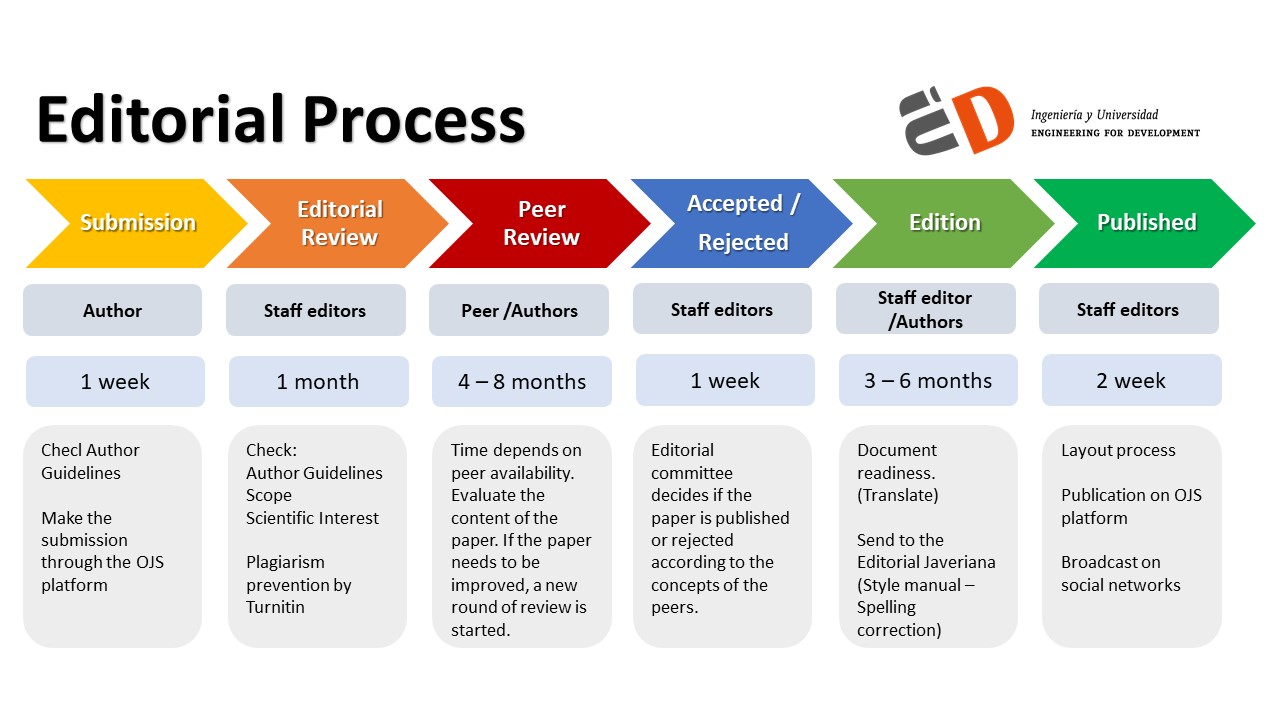Ingeniería y Universidad: Engineering for Development disseminates novel high-quality articles in different areas of engineering. The journal especially welcomes articles of local and regional relevance in areas such as robotics and industrial automation, bio-engineering, environmental engineering, industrial engineering and transportation engineering, and logistics. Original articles are particularly welcome, but also review articles are considered. The journal is published in English.
All contributions will be subjected to the peer-review process. The names of both authors and reviewers will not be known to either party. The assigned reviewers will utter their concept pronounce their concept as to the quality of the papers, both in their scientific content and their content, following the guidelines and criteria established by de Journal’s Editorial Board. Evaluation results will be announced in the following terms: To be published, pending some observations, and rejected.
An article with a pending concept can be submitted again by the authors to be subjected to the new peer review process. The Journal’s Scientific Committee may also contribute suggestions in order to improve the manuscript and will ultimately decide whether the contribution is worth publishing in Ingeniería y Universidad: Engineering for Development.
The publication of an article does not imply that the Editor, the Journal’s Editorial Committee or the School of Engineering agree with its content. Responsibility for the work’s content falls entirely and exclusively on the authors. All papers must be original and unpublished. The author or authors must warrant the unpublished nature of their work and that they have obtained the relevant permit from whomever incumbent to use any material which does not belong to them. The Journal’s Editorial Committee reserves the right to accept and publish work already published. In the last case, the author or authors must acknowledge this fact and thus include the respective bibliographic reference.
Editorial Process
All papers are submitted to an editorial review process in order to establish their relevance in the journal and compliance with the structure requirements. They will then be evaluated by academic peers appointed by the journal editor or section editor. The journal has a type of double-blind peer review. The result of the evaluation is given in terms of publishable, pending with comments or rejected. An article that has received the concept of pending with observations can be submitted again for review by the peer reviewers.

Editorial Review
The editorial or filter review process consists of verifying compliance with the journal's application requirements, which are described in the authors guide. Additionally, it is determined if the article corresponds to the theme of the magazine and if it may be of interest to readers. At this stage the articles can be rejected, authorized to be evaluated by peers or returned to be corrected according to the suggestions of the editor or section editor.
Peer Review
The journal counts with a type of assessment of double blinded peer review, in which the name of the authors, the peers reviewers, along with their institutional filiations, are kept in confidentiality, as a way of guarding objetivity and impartiality to assess the manuscripts. The papers will be submitted to two or more evaluators, or depending on the decisions of the editorial committee or the editor-in-chief. The peer reviewers selected for the evaluation of the articles must be experts in the subject matter of the postulated document and their preferred academic level must be doctorate, but in some evaluators with a master's level are accepted.
The general criteria of the evaluation are: level of interest for the international community, novelty, quality of the methodology, factual content, quality of the citation, quality of the data analysis and syntax. The opinion of the article consists of: accepted, recommended for publication with changes (if the recommendations are not followed in the times stipulated for them, the articles will be rejected) or rejected. This concept will be issued based on the following criteria, which are evaluated on a qualitative scale for each section of the article: (1) Very high; (2) High; (3) Medium; (4) Low and (5) Very low. And the sections to be evaluated with this scale are: title, summary, introduction, methods, results, discussion, and references.
Authorship
According to COPE, Authorship credit should be based only on: (1) substantial contributions to conception and design, or acquisition of data, or analysis and interpretation of data; (2) drafting the article or revising it critically for important intellectual content; and (3) final approval of the version to be published. For more information, consult the following link: https://doi.org/10.24318/cope.2018.1.1. Regarding the order of the signatures, it will be according to the request of the authors.
